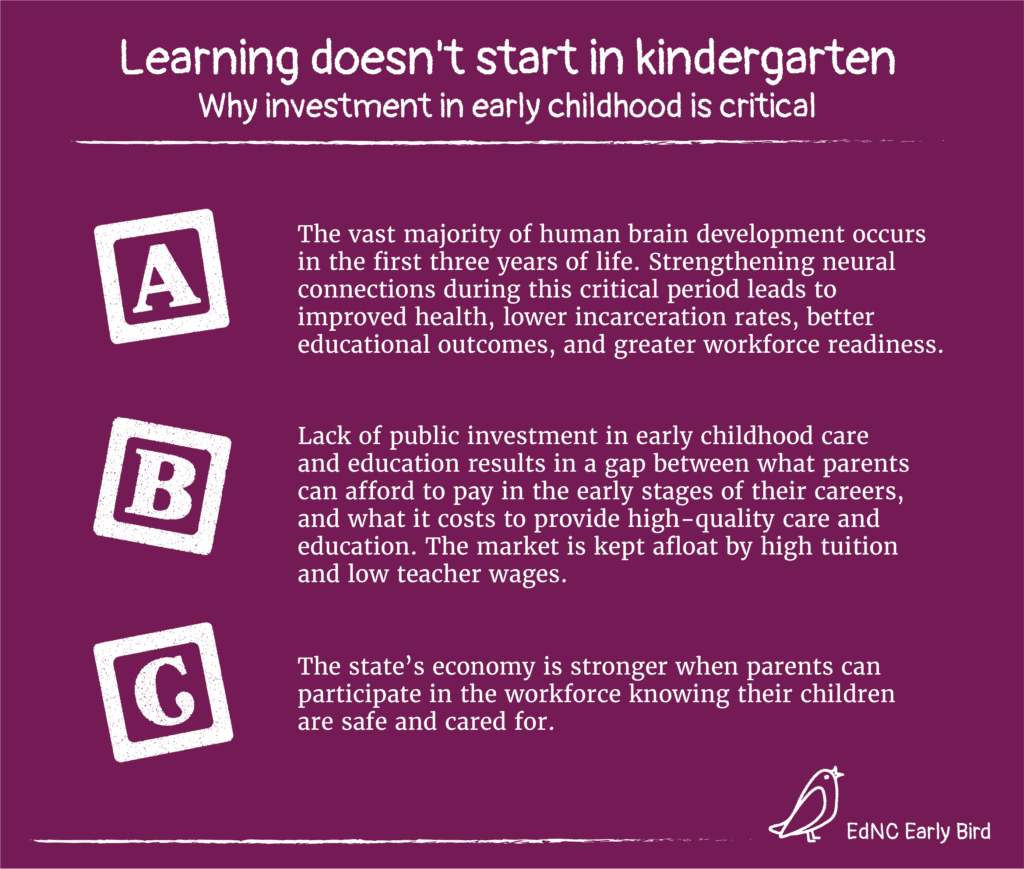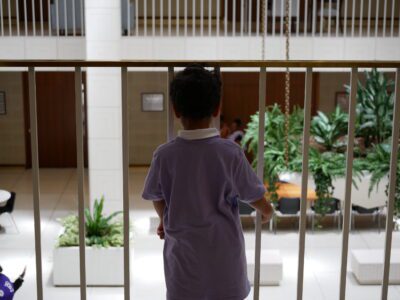
A new short documentary, “Take Care,” explores how a lack of affordable, sustainable child care hurts families, communities, and businesses. It premiered Wednesday at the North Carolina Museum of Natural Sciences.
“Child care is an everybody problem, and it’s an everybody responsibility, and it’s an everybody solution,” said Susan Gale Perry, CEO of Child Care Aware of America, on a panel after the screening.
The film was funded by the state Department of Health and Human Services (DHHS), which oversees child care. It was created by Neimand Collaborative and SeeBoundless. The documentary is available free of charge here. DHHS has created a toolkit for local screenings and discussions. Watch the entire video at the end of this piece.

I am featured in the film as an independent voice on the state’s child care landscape. I attended the screening, which was followed by the panel discussion, and came away with the following:
- Local elected officials are becoming more vocal about child care challenges and potential solutions.
New Hanover County Commissioner Rob Zapple, who is also in the film, said on the panel that he thinks local governments have a role to play in investing in child care.
He said the crisis could be solved by making progress in four areas: higher-quality experiences for children, higher pay for child care teachers, lower costs for parents, and more supply.
“If you’ve got that in your image, in your identity, in your community, so many good things will happen, not only with the families but with the businesses who want to be there,” Zapple said. “… That’s how important I believe this one particular issue is. Everybody can relate to it. If we can solve those four pillars, or move them forward, we will get that positive community identity out there, and man, the sky’s the limit.”
The NC Early Childhood Foundation has a toolkit on local financing for early learning, including case studies from throughout the country. Voters approved several local and state ballot initiatives for child care and other early childhood issues in the 2024 election, as reported by The Hechinger Report. - Businesses have options to solve child care issues beyond benefitting their own employees.
As low child care access and affordability present barriers to hiring and retaining workers, business leaders are interested in solutions. Debra Derr, policy leader with the state Chamber of Commerce, said on the panel that members are speaking directly with state legislators.
“Three or four years ago, we were not talking about child care,” Derr said. “It was not on our radar, but now that it is, we’re finding that businesses are concerned about hiring because they realize that they cannot hire people, because some folks just don’t have child care.”
Some businesses are looking into subsidizing care for their own employees, hosting on-site programs, or participating in a cost-sharing program like Tri-Share. Gale-Perry lifted up a model in Iowa, where businesses contributed to a fund that the local and state governments have now also given to, which raises child care teacher compensation.
“It wasn’t an employee benefit; they said, ‘We’re going to invest in a collective fund, and you distribute those funds to pay teachers better,'” Gale-Perry said. - The Western region of the state was already struggling before Hurricane Helene wrecked communities, including child care programs.
The film spotlighted the seven centers that closed in October 2023 because of insufficient funding.
“There was nowhere for kids to go,” said Todd Goins, director of social services in Clay County.
As another 36 programs remained closed on November 1 due to Helene, it’s important to remember that these communities were starting with a particular deficit in care options for children and families, and will need both immediate and ongoing support. - Programs are facing yet another funding cliff.
As state stabilization funding runs out at the end of December, child care facilities will lack the funding they have been using to maintain teacher wages and prevent further tuition increases.
Advocates are asking legislators next week to allocate $100 million to prevent short-term closures and price increases for families.
Rhonda Rivers, vice chair of the Child Care Commission, said immediate funding is needed, as well as sustained investment and education of the workforce.
“It should be an automatic annual part of the budget in some capacity with investments,” Rivers said. “…What we understand is that if we don’t fix it now, it’s going to be a bigger problem.”
Recommended reading



